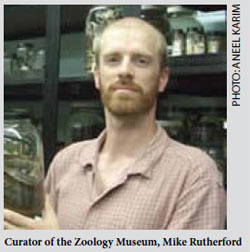 |
 |
 |
|
August 2010
|
Curator of the curiousBy Vaneisa Baksh
He’d been skinning a squirrel, just before we settled down to talk. On the desk in his office there is a plastic sour cream container right next to a small jar of scorpions. Figuring there might be some equally grisly content instead of sour cream, I ask with feigned casualness. He grins and pulls the lid off. Raisins and nuts. Next to the scorpions. He obviously loves what he does, and as he talks about his life, it is clear why. Born in Scotland, with a mum who volunteered at a zoo, the family moved to Malawi when he was about three and he grew up around all kinds of creatures. “The best was when mum brought home a lion cub which had been rejected,” he says as he lists off the tortoises, dogs, cats, owls and other birds who were constantly part of their household. When he was eight, they moved back to Scotland and he entered the school system. He’d always loved Biology and the Sciences in general and he did a Zoology degree at Glasgow University. He started doing Medicine, but after a year realised it was not for him. He took charge of the Tropical House at Newquay Zoo in Cornwall and that lasted for six months, then he went off to Glasgow Museum where he stayed for seven years as Curator of Invertebrates. He had filled in for a friend on an expedition to Trinidad and when he saw the vacancy for the job at St. Augustine, he felt it was a direct call to him. Six months on, in between cataloguing and ensuring specimens are properly preserved, he is looking for ways to get the museum used more by schools, researchers and other museums. He’s thinking of something of a Bio-Blitz competition: where experts and members of the public spend 24 hours on the campus trying to record how many different species they can find. As a hotspot of bio-diversity, the number of species they find is sure to be high; but no chance they’ll find another Mike Rutherford. |

 It might not be kind to say he is one of the oddities at the Zoology Museum, but it is tempting because there is such a pleasing oddness about Mike Rutherford that one can’t help but think he is a good choice for its curator.
It might not be kind to say he is one of the oddities at the Zoology Museum, but it is tempting because there is such a pleasing oddness about Mike Rutherford that one can’t help but think he is a good choice for its curator.